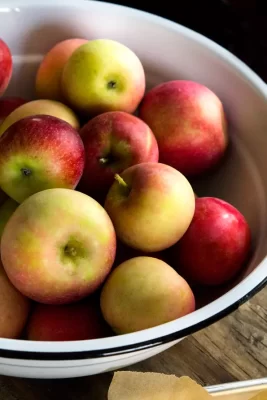
Apples are one of the most popular and widely consumed fruits worldwide, thanks to their delicious taste, nutritional benefits, and versatility in culinary applications. Gluten, on the other hand, is a protein commonly found in wheat, barley, and rye, which gives dough its elasticity and helps it rise.
The question of whether apples contain gluten is a common one, especially among individuals with gluten intolerance or celiac disease. In this article, we will explore the relationship between apples and gluten, the potential risks of consuming gluten, and the benefits of including gluten-free apples in your diet.
Understanding Gluten Intolerance and Celiac Disease
Gluten intolerance is a broad term used to describe various conditions in which an individual experiences adverse symptoms after consuming gluten. These symptoms can range from mild discomfort to severe gastrointestinal distress, including bloating, diarrhea, constipation, and abdominal pain.
Celiac disease is an autoimmune disorder in which gluten consumption triggers an immune response that damages the small intestine. This damage can lead to malabsorption of nutrients, which can result in malnutrition and other serious health problems. The only treatment for celiac disease is a strict gluten-free diet.
Both gluten intolerance and celiac disease require careful management of dietary choices to avoid gluten-containing foods and prevent adverse reactions. It is crucial for individuals with these conditions to understand which foods contain gluten and which are safe to consume.
Also Read: Are kiwi Fruits Acidic or Alkaline
Potential Risks of Gluten Consumption
For individuals with gluten intolerance or celiac disease, consuming gluten can lead to a range of health problems. These include:
- Gastrointestinal symptoms: Consuming gluten can cause digestive problems such as bloating, gas, abdominal pain, diarrhea, and constipation.
- Nutrient deficiencies: In individuals with celiac disease, gluten can damage the lining of the small intestine, impairing nutrient absorption and leading to deficiencies in essential vitamins and minerals.
- Increased risk of other autoimmune diseases: Celiac disease is associated with an increased risk of developing other autoimmune diseases, such as type 1 diabetes and multiple sclerosis.
- Neurological symptoms: Some individuals with celiac disease may experience neurological symptoms such as headaches, migraines, and peripheral neuropathy.
- Skin conditions: Gluten sensitivity has been linked to various skin conditions, including eczema and psoriasis.
- Increased inflammation: Gluten has been shown to increase inflammation in the body, which can contribute to various health problems, including arthritis, heart disease, and cancer.
For these reasons, it is essential for individuals with gluten intolerance or celiac disease to avoid consuming gluten-containing foods.
Are Apples Gluten Free?
Yes, apples are gluten-free. Apples are a fruit and do not contain gluten, which is a protein found in wheat, barley, and rye. Therefore, apples are a safe and healthy food choice for individuals with gluten intolerance or celiac disease.
However, it is important to note that cross-contamination can occur during food processing or preparation, which can lead to gluten contamination. For example, if apples are processed in a facility that also processes wheat products, there is a risk of gluten cross-contamination. Therefore, individuals with gluten intolerance or celiac disease should always check food labels and confirm with the manufacturer if the apple products they are purchasing are certified gluten-free.
Also Read: Is coconut Water Acidic? All you need to know
Benefits of Eating Gluten-Free Apples
In addition to being safe for individuals with gluten intolerance or celiac disease, there are several potential benefits to eating gluten-free apples:
- Nutritional value: Apples are a good source of fiber, vitamin C, and antioxidants. Eating a diet rich in fruits and vegetables has been linked to numerous health benefits, including reduced risk of chronic diseases.
- Reduced inflammation: Gluten is known to increase inflammation in the body, which can contribute to various health problems. Eating gluten-free foods, including apples, can help reduce inflammation and promote overall health.
- Improved digestive health: For individuals with gluten intolerance or celiac disease, avoiding gluten can improve digestive symptoms such as bloating, gas, and abdominal pain.
- Versatile ingredient: Apples are a versatile ingredient in cooking and baking and can be used in a variety of sweet and savory dishes, making them a great addition to a gluten-free diet.
- Convenient snack: Apples are a convenient and portable snack, making them an easy and healthy choice for on-the-go snacking or as part of a packed lunch.
Overall, incorporating gluten-free apples into your diet can offer several health benefits and provide a delicious and convenient source of nutrition.
Gluten-Free Apple Recipes
Here are some gluten-free apple recipes you can try:
- Gluten-Free Apple Crisp: In a bowl, mix sliced apples with cinnamon and a bit of sugar. In another bowl, mix gluten-free oats, almond flour, brown sugar, and melted butter. Layer the apple mixture in a baking dish and top with the oat mixture. Bake in the oven until crispy and golden brown.
- Gluten-Free Apple Cinnamon Muffins: In a mixing bowl, combine gluten-free flour, cinnamon, baking powder, and salt. In another bowl, whisk eggs, almond milk, melted butter, and honey. Add grated apple to the wet mixture, then stir in the dry ingredients. Pour the batter into muffin cups and bake in the oven until golden brown.
- Gluten-Free Apple Cider Donuts: In a bowl, whisk together gluten-free flour, baking powder, salt, and cinnamon. In another bowl, whisk together eggs, sugar, apple cider, melted butter, and vanilla extract. Stir the dry ingredients into the wet mixture, then fold in grated apple. Spoon the batter into a donut pan and bake until lightly browned.
- Gluten-Free Apple and Spinach Salad: In a bowl, mix baby spinach, sliced apples, crumbled goat cheese, and toasted almonds. For the dressing, whisk together olive oil, apple cider vinegar, honey, and Dijon mustard. Drizzle the dressing over the salad and serve.
These recipes are just a few examples of the many delicious and healthy gluten-free apple recipes available. Experiment with different recipes and cooking techniques to discover new ways to enjoy the health benefits of apples in a gluten-free diet.
How to Make sure That Your Apples are Gluten Free
Apples are naturally gluten-free, but cross-contamination can occur during food processing or preparation, which can lead to gluten contamination. Here are some ways to ensure that the apples you purchase and eat are gluten-free:
- Check food labels: When purchasing packaged apple products, always check the ingredient list for any gluten-containing ingredients. Look for products that are certified gluten-free.
- Confirm with the manufacturer: If you are unsure if a particular apple product contains gluten, contact the manufacturer and ask if it is gluten-free.
- Avoid processed apple products: Processed apple products, such as apple pie filling or apple sauce, may contain added ingredients that contain gluten. It is best to make these products at home or purchase certified gluten-free versions.
- Check for cross-contamination: When purchasing fresh apples, check to see if they are stored near gluten-containing products or processed on shared equipment. If in doubt, wash the apples thoroughly before consuming.
By following these steps, you can ensure that the apples you consume are gluten-free and safe for individuals with gluten intolerance or celiac disease.
Conclusion and Recommendations
In conclusion, apples are a safe and healthy food choice for individuals with gluten intolerance or celiac disease. Apples are naturally gluten-free and offer numerous health benefits, including fiber, vitamin C, and antioxidants. Additionally, incorporating apples into a gluten-free diet can help reduce inflammation, improve digestive health, and offer a versatile ingredient for cooking and baking.
To ensure that apples remain gluten-free, it is essential to check food labels and confirm with the manufacturer if the apple products are certified gluten-free. Cross-contamination can occur during food processing or preparation, which can lead to gluten contamination.
Incorporating gluten-free apples into your diet is easy and convenient. Enjoy them as a snack, add them to salads, or use them in gluten-free recipes such as apple crisp or apple muffins.
If you have gluten intolerance or celiac disease, it is important to consult with a healthcare professional or a registered dietitian to ensure that you are getting all the necessary nutrients and following a healthy gluten-free diet.





